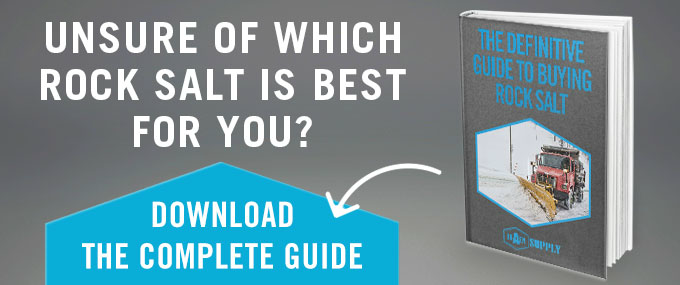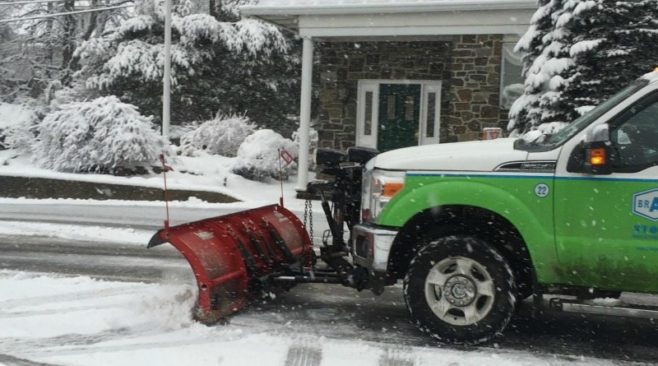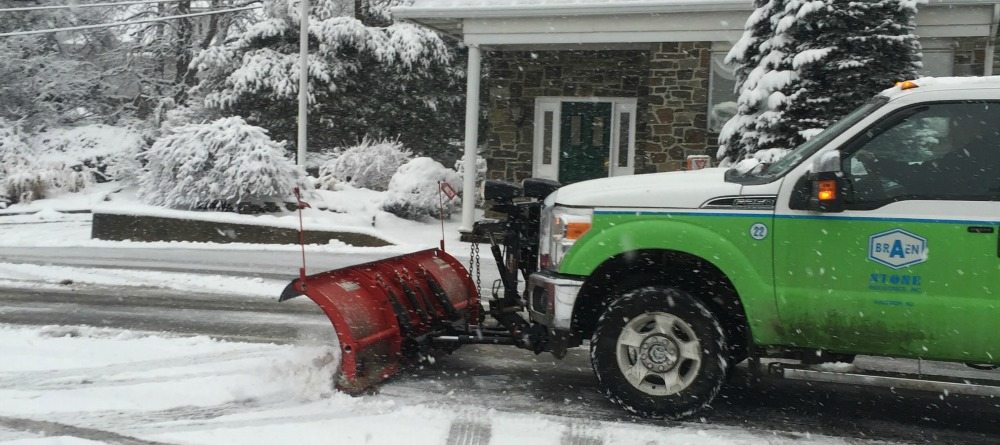Got ice? If you’re like most other NJ homeowners, you’re constantly facing the battle of slippery, slick conditions right outside your front door.
Sidewalks, front paths and driveways are all susceptible to becoming iced over after periods of precipitation and very cold temperatures. This, of course, can create dangerous conditions for foot and vehicular traffic.
Fortunately, rock salt makes it easy to protect your property and your loved ones all winter long. Here’s a look at everything you need to know about Rock Salt.
Rock Salt At-A-Glance
Sodium Chloride (most frequently referred to as “rock salt”) has been used as a means of lowering the freezing point of water for centuries. When rock salt is mixed with water, it creates a brine that will not freeze at the normal temperature of 32 degrees Fahrenheit.
This is great news for people who live in climates where the temperatures regularly dip below freezing, because it means that paved surfaces that have been exposed to snow, rain, sleet or other sources of water will not be prone to freezing over as the temperatures drop. Instead, the water will remain in liquid form, which is much safer.
Rock salt is so effective that even large corporations and municipalities make use of it in order to protect big campuses and major road networks. It’s truly the best way to keep icy patches from developing on your property that could potentially cause bodily harm and injury.
Determining Your Needs
Once you’ve recognized the value of sodium chloride, it’s time to figure out how much material you’ll need to get you through the winter. This, of course, will depend on the overall size of your coverage area, as well as the projected precipitation in your area.
Because we get so much winter weather in our area, it’s safe to assume that you’ll need to prepare for several days of precipitation per month. Typically, ice melting manufacturers will base their product’s usage upon the total square footage of your driveway, sidewalk, walkway or other paved surface.
This will require you to measure the length and the width of your total coverage area (in inches). Multiplying these two numbers together will give you the square footage. As a general rule, rock salt is sold by the 50-pound bag.
Each of these bags will typically hold about 80 cups of sodium chloride. Because a single cup of the material holds the melting power to take care of 20 square feet of ice, you can estimate that one 50-pound bag of rock salt will be effective for 1600 square feet of property.
Those with smaller properties will find that they can usually get through the winter with several bags of rock salt, and will therefore get the best deal when they simply buy their ice melting materials by the bag. If you’ve got a lot of ground to cover, however, you may want to consider buying in bulk.
Pallets (containing 49 bags each) and truckload orders (18 pallets each) will help you to get a lower cost per bag and will allow you to save money this winter. You may even consider going in on your order with one or more of your neighbors in order to take advantage of bulk savings.
When and Where to Buy
Too many homeowners are in the habit of waiting until last minute to rush out and pick up their ice melting materials. Staying at home until the weatherman (or weather woman) announces that a big storm is about to roll in, though, is a very bad idea.
First, you run the risk of being caught outdoors when the winter weather starts up, or being stuck in stores that are being mobbed by frenzied shoppers who also waited until the last minute to prepare! And secondly, you may find that suppliers quickly start to run out of sodium chloride, as their ice melting products fly off the shelves.
This could mean that you aren’t able to get any rock salt, or that you end up paying a premium price for a limited quantity of material. You’ll save time, money and stress when you plan ahead and stock up in advance.
Having the ability to calculate your needs will help you figure out what quantity of sodium chloride to purchase so that you can have plenty of material on hand whenever Mother Nature strikes. For the best deals, we recommend that you buy rock salt from a direct supplier.
Although some grocery stores and even roadside stands might offer bags of sodium chloride throughout the winter months, these products are often being resold at inflated prices so that the supplier can make a profit. Cutting out the middleman and going straight to the source will keep some extra spending money in your pocket.
Applying Rock Salt
It’s always important to carefully read manufacturer instructions before applying sodium chloride or any other ice melting product to the paved areas throughout your property. Failing to spread enough material will result in a waste of product while promoting unsafe conditions throughout your driveway and sidewalk.
Over-spreading, on the other hand, will cause you to waste a lot of your materials without any added benefit. Make sure that you understand exactly how much ice melt should be applied per square foot, and employ the right measuring tools to ensure accuracy. Be sure to also check for any safety specifications, such as wearing gloves during the application process.
Storing Rock Salt
What about all of the extra rock salt that you’ve purchased in advance but haven’t had the chance to use yet? Knowing how to properly store your ice melting materials is a very important part of protecting your initial investment and making sure that you’ve got enough ice melting product on hand in the weeks and months ahead.
Keep in mind that sodium chloride is activated when it comes in contact with water. Because of this, it’s important to make sure that the salt is stored up off of the floor and in an area where it won’t be exposed to any moisture.
Ice melting products are also prone to clumping when they become too cold. This will make the materials much less effective when spread on paved surfaces.
To avoid these problems, we recommend that you keep your stored rock salt in a facility that will not be exposed to temperatures below freezing. For best results, consider keeping your bags of sodium chloride in a sealed container like a clean, empty trash can, and stored inside of an insulated garage or shed.
Buying Rock Salt in NJ
Braen Supply is the most trusted supplier of rock salt throughout NJ and the Tri-State area. We offer the highest quality ice melting materials, including sodium chloride, at the lowest and most competitive wholesale rates around.
We strive to offer a wide variety of materials, and keep our stores well-stocked so that you can protect your property during your hour of need. Depending on the desired quantity, we can sell rock salt by the bag, pallet or truckload. Our ice melting products can be picked up or bulk delivered to areas throughout parts of NJ, NY, NYC and PA.



